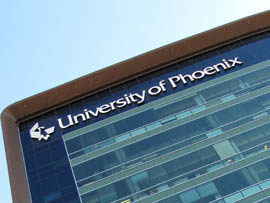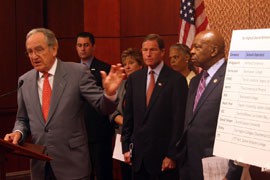Cronkite News has moved to a new home at cronkitenews.azpbs.org. Use this site to search archives from 2011 to May 2015. You can search the new site for current stories.
For-profit college practices come under fire in Senate investigation
WASHINGTON – A Senate investigation of 30 for-profit college companies, including four based in Arizona, accused the schools of focusing on profits over student services, of wasting taxpayer dollars and posting high dropout rates.
The two-year investigation by the Senate Health, Education, Labor and Pensions Committee found a range of problems that run “deep within the for-profit sector,” which received $32 billion through federal student aid in the 2009-10 academic year.
It said the government gets little return on that investment, with most students at for-profit institutions failing to graduate.
“These practices are not the exception, they are the norm,” said Sen. Tom Harkin, D-Iowa, who issued the report Monday. “They are systemic throughout the industry with very few individual exceptions.”
But a minority report by Republican staffers on the committee said that while it is “indisputable that significant problems exist” at some for-profit institutions, Democrats “did not seek bipartisan input or support” for the investigation. The majority’s “biased conduct” throughout the probe raises doubts about the accuracy of the report, they said.
The 1,000-page report said the for-profit college model appeals to non-traditional students and has grown in popularity, with enrollment rising 225 percent between 1998 and 2008 to account for 10 to 13 percent of all college students.
But the report said that more than half the students enrolled in a for-profit program in 2008-09 left without a degree or diploma. The 30 companies studied had nearly 1.1 million Americans enrolled between 2008 and 2009, but more than half had withdrawn by mid-2010, it said.
“They are left with student loan debt but without the benefits of a college degree or certificate,” the report said.
Companies from Arizona that were studied were Anthem Education Group, Apollo Group Inc., Grand Canyon Education Inc. and Universal Technical Institute Inc.
They were blasted for high withdrawal rates, high loan-default rates, a low number of career-services employees, a high percentage of spending on marketing compared to instruction, and “troubling” recruitment tactics, among other problems.
The findings were not all negative though.
The results from Universal Technical Institute, which offers vocational programs, suggest that students are finishing the program and finding jobs, even though it had high tuition rates.
And Harkin cited Apollo, which operates the University of Phoenix and other schools, as a company taking “positive steps in the right direction.”
While the report cited problems with Apollo – such as high dropout rates and putting financial success over student success – it said the company has addressed some concerns with recruiting and marketing practices and career services. It has also instituted a university orientation program.
But “more remains to be done,” the report said.
Mark Brenner, Apollo’s senior vice president of external affairs, said the report failed to capture the “truth about University of Phoenix and our students.”
“The biggest shortcoming from this review … is that it fails to recognize the intrinsic value of our institution: a value that is not only helping students complete degree programs today, but that is pointing towards a brighter future for American higher education,” Brenner said Monday in a prepared statement.
Calls to Grand Canyon and Anthem were not immediately returned Monday.
Harkin said he hopes colleges will be “moved by this investigation and final report to initiate reforms.”
The report suggests three major changes: Enhance transparency by collecting relevant and accurate student outcome information, strengthen federal financial aid oversight and create meaningful protection for students.
Harkin was not hopeful there would be any legislative action on the issue this year, but expects it could come next year when the Higher Education Act is up for renewal.
“What’s important here is we’re setting the stage for some very severe questions to be asked,” he said.








